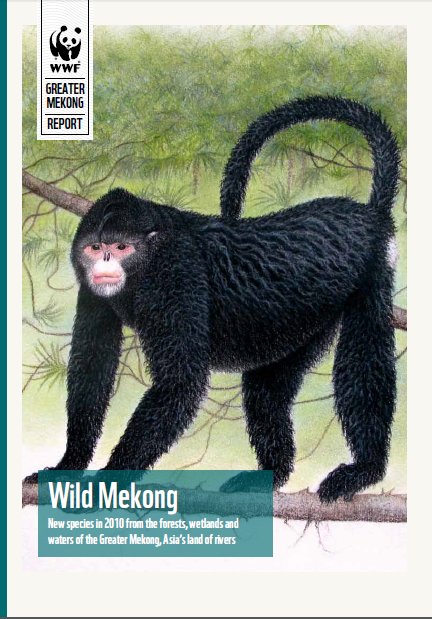A new monkey, a self-cloning skink, five carnivorous plants, and a unique leaf warbler are among the 208 species newly described by science in the Greater Mekong region during 2010. In total 145 plants, 28 reptiles, 25 fish, 7 amphibians, 2 mammals and 1 bird have been discovered in the last year.
This rate of discovery marks Asia’s land of rivers as one of the last frontiers for new species discoveries on our planet.
The Greater Mekong region of Southeast Asia through which the Mekong river flows comprises the countries of Cambodia, Laos, Myanmar, Thailand, Vietnam and China (including Yunnan province). The region is home to some of the planet’s most endangered and charismatic wild species including tiger, Asian elephant, Mekong dolphin and Mekong giant catfish, in addition to hundreds of newly discovered species.
Between 1997 and 2009 an incredible 1,376 species were discovered by science across this region alone.
However, while these discoveries highlight the unique biodiversity of the Greater Mekong they also reveal the fragility of this region’s diverse species and habitats. The plight of the wild tiger, whose numbers have dropped by a dramatic 70 percent in a little over a decade, and the extinction of the Javan rhino in Vietnam during 2010 are urgent reminders that biodiversity is still being lost at an alarming rate from man-made
pressures.
Rapid, unsustainable development and climate change impacts are profoundly affecting biodiversity and ecosystem services and consequently the millions of people who depend on them. The Greater Mekong region is warming and experiencing more extreme floods, droughts and storms as a result of shifting rainfall patterns. These changes are exacerbating agricultural expansion and unsustainable infrastructure pressures on natural ecosystems and the services they provide.
Today the Greater Mekong region is an integral part of one of the top five most threatened biodiversity hotspots in the world.
The central importance of the region’s shared natural resources cannot be overstated. The economic and social development of the Greater Mekong depends on the continued productivity of its inter-connected ecological systems. Only intact, healthy, and diverse natural ecosystems can provide the resilience to ensuing climate change while ensuring continued access to water, energy, food, commodities, and livelihoods for over 300 million people.
Sound regulatory frameworks implemented via harmonized policies across the Greater Mekong will help the region’s countries adequately address complex, challenging, regional-scale issues like habitat loss and fragmentation, unsustainable natural resource use, and climate change. Addressing these challenges requires stronger regional collaboration at the broader, ecosystem scale; countries cannot effectively solve these problems thinking only within their own borders. Regional collaboration needs high levels of political support. It also needs to be formalized through a regional agreement that is supported by an effective institutional framework mechanism. Only this can ensure future security for the millions of people that rely upon the Greater Mekong system.














